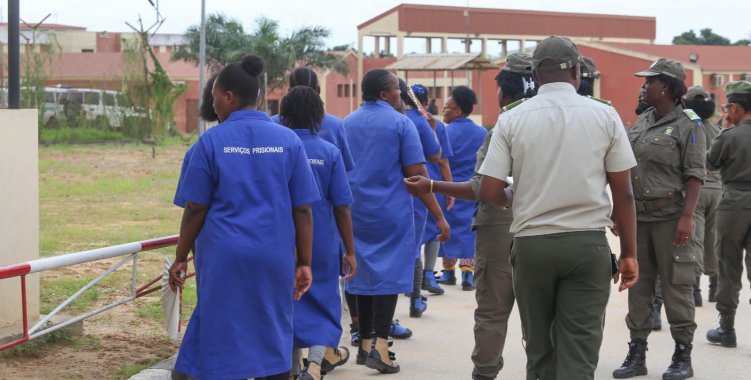Activists Adolfo Campos, Abraão dos Santos, the "Pensador", Gilson da Silva Moreira "Tanaice Neutro" and Hermenegildo André "Gildo das Ruas", have been free since January 6, after a pardon from the president, João Lourenço, in 51 citizens across the country as part of the celebrations of the 50th anniversary of the country's independence.
This Friday, at a press conference promoted by Friends of Angola (FoA) and the Observatory for Social Cohesion and Justice (OCSJ), Angolan civic organizations, the four activists said that their arrest and conviction in September 2023 "was illegal " and had "political motivations".
They said they were "unjustly" deprived of their freedom for one year, three months and 21 days "at the will of the Angolan president", saying the pardon was only intended to convey the message of João Lourenço as "a good Samaritan".
The presidential pardon, they said, is a "poisoned gift in that it cunningly forces people to acknowledge that they have been forgiven and to unconsciously accept crimes not committed."
They also denounced inhumane conditions in the country's prisons, including deaths of prisoners, physical and psychological torture, lack of food, accommodation and conditions for meeting physical needs.
"We were deprived of our freedom in a pigsty and not in a prison. What happens in the prisons of our country is genocide," said Adolfo Campos.
"In the infectious diseases department of the São Paulo Prison Hospital, where I was referred due to a suspected lung infection, more than four prisoners die every day," lamented the activist, calling for a general amnesty for all prisoners in the country.
Claiming to be "dissatisfied" with the current social and economic situation in Angola, Gilson da Silva Moreira assured that he will continue fighting for revolution and the well-being of citizens.
The activist even called for Angolans to unite in favor of a more just and democratic country, said that the country's current problem "is hunger" and expressed his willingness to be the head of an opposition party's ticket in the 2027 general elections to "with courage we change the country".
Collective and continuous struggle, courage and unity of Angolans were the appeals of activist Abraão dos Santos.
The four activists reaffirmed that they were unjustly arrested and assured that they will continue with all actions permitted by Angolan laws in order to ensure that their violated rights prevail and the restoration of legality with dignified and inclusive justice.
The process involving the activists "was not dignified, it was a political setup to attack critical and dissenting voices in the country," said lawyer and OCSJ coordinator Zola Bambi.
Asked whether they would follow the son of the former president, José Filomeno dos Santos "Zenu", one of the 51 pardoned, who renounced the presidential pardon, Zola Bambi considered that the former president of the Angolan Sovereign Fund "enjoyed a certain advantage because he was under house arrest."
"If they (the activists) had what was denied to them, provisional freedom, we could have reached the end, but it was necessary to leave the prison because they should not be there. They left because the door opened for them to leave and not because they accepted the pardon", he justified.
In a letter from Zenu sent to President João Lourenço, cited by SIC, he considers the pardon to be a "legal mistake", as it nullifies the fulfillment of the sentence, but maintains the effects of the conviction.
For FoA and OCJS, the arrest of the aforementioned activists, considered by civil society and opposition parties as "political prisoners", was "illegal", and they were denied parole, appeals and a habeas corpus order because their release "depended on of the higher orders".
"For this reason, they were only released due to the discretionary power of the holder of the executive branch who, taking advantage of this, promulgated the decree, emptying the powers of the judiciary and legal procedures", says the statement from the NGOs presented at the meeting.
For these organizations, the arrest of the activists was intended to intimidate civil society and create a climate of fear, emphasizing that they did not violate the Constitution or the right to assembly and demonstration.







